








World Pharmacist Day was introduced by the International Pharmaceutical Federation and has been celebrated on September 25th each year as an opportunity to recognize the achievements of the pharmacy profession in improving the health and well-being of the people we care for. This years World Pharmacist Day Theme is “Think Health, Think Pharmacist.”
World Pharmacists Day represents an opportunity to educate others about our profession’s value and potential in meeting health needs and addressing health challenges But how have we as a profession improved over the years?

Over the years, community pharmacists have evolved and expanded into greater responsibilities, leading to increased access to primary health care for Canadians Therefore, recognizing them as an essential and necessary provider in community primary healthcare Pharmacists have taken on responsibilities such as: medication reviews, ambulatory condition management, smoking cessation programs, renewal, extension and adaptation of existing prescriptions, prescribing and administration of injectable drugs for preventable diseases and immunization and harm reduction services
A pharmacist with the Additional Prescribing Authorization (APA) license has the ability to assess patients, order lab tests and prescribe medications APA improves access to healthcare services, certainly in areas where physician availability is limited. It allows pharmacists to utilize their expertise, contributing to better patient care and more efficient primary healthcare


The Canadian Foundation for Pharmacy showed the increase rates for prescribing services, Comprehensive annual care plans, and their respective follow-ups in Alberta. In particular, we will zoom into trends in the fiscal year between April 1, 2023 to March 31, 2024 Alberta stands out for the steep upward trajectories of two services that are unique to the province: comprehensive annual care plans (CACPs) and additional prescribing authorization (APA).
1
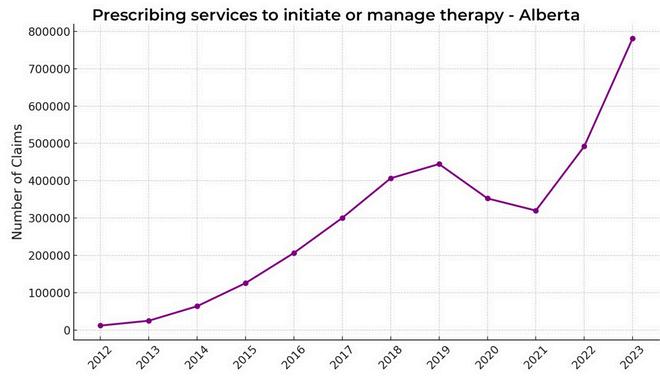
2

3
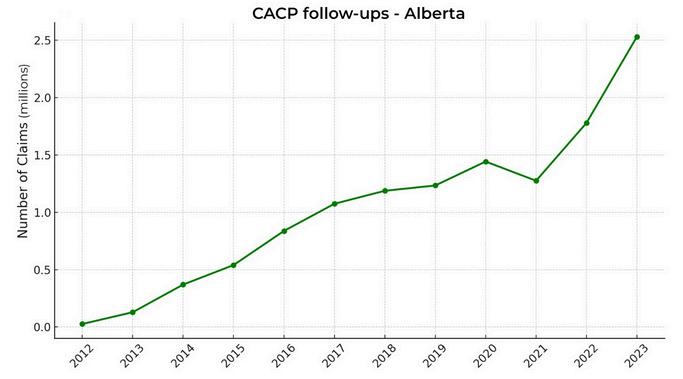
Prescribing services in Alberta has increased outstandingly from 491,990 to 781,407 claims in fiscal year 2023-2024, reaching a 59% increase (a new record). These services include prescribing any schedule 1 drug, vaccine, or for ambulatory conditions [1] Therefore, substantially proving how APA can allow pharmacists to do more for their patients by efficiently address their needs.
Pharmacy CACP claims went from 380,357 to 482,089 (a 27% increase) in fiscal year 20232024. [1] Therefore, giving pharmacists increased autonomy and control over their patients' care As a result, pharmacists have a better opportunity to not only help people, but also grow as healthcare professionals
CACP follow-up claims increased by 40% in 2022-2023 and by 42% in 2023-2024, and has easily surpassed two million for the first time. It reached 2 5 million compared to 1 8 million in 2022-2023 [1] In other words, an increase of 4.7 to 5.2 follow-ups per CACP conducted by pharmacists was seen from 2022-2023 to 2023-2024. [1] Overall, this displays how primary care has become increasingly accessible to patients, due to pharmacist interventions.


Similar trends are seen in other provinces. In a study conducted by the Pharmacy Association of Nova Scotia, results showed that patients were highly satisfied by pharmacy primary care clinics In figure 4, patients were asked to rate their satisfaction out of ten 98% of patients responded having positive experiences and felt confidence in the ability of the pharmacist to help with their health needs. Patients also mentioned that if they needed care in the future, they will use the pharmacy care clinic again. [2]
A patient says “I am extremely grateful for this service I didn’t feel like a number here, I felt like a human. Thank you for everything. I hope this service continues I will use it again in the future and recommend to anyone.” [2]
Results show that patients are satisfied with the care they receive from pharmacy primary care clinics and are very likely to return

68% (more than two-thirds) of patients with only hypertension met their target
57% (more than half) of patients with hypertension and diabetes mellitus showed a decrease of at least 5mmHg
Figure 5: Proportion of patients with hypertension meting blood pressure targets
Reference [2] Levin C, Buote R, Dunbar L. Community Pharmacy Primary Care Clinics: Final Learning and Evaluation Report [Internet]. Pharmacy Association of Nova Scotia. Research Power Inc.; 2025 [cited 2025 Aug 11]. Available from: https://pans.ns ca/sites/default/files/final eval_report_short_-_pans cppcc eval_updated_final_march_13_2025_003.pdf

Do you want to be involved in shaping the future of your profession? This is an opportunity to help your patients lower their risk of cardiovascular disease and to generate evidence of the impact your work has on patient outcomes x
Why:
Cardiovascular disease (CVD) is still a leading cause of death in Canada, yet risk factors for CVD have been known for decades
Pharmacists are well-positioned to help patients lower their CV risk, but have requested support to do so
We need further evidence to show the impact your care has on patient outcomes.
What does the Care Pathway look like?
Who can get involved?
Pharmacists with their APA
Your pharmacy does not have to have a primary care clinic to be involved in the PRxOACT Initiative.
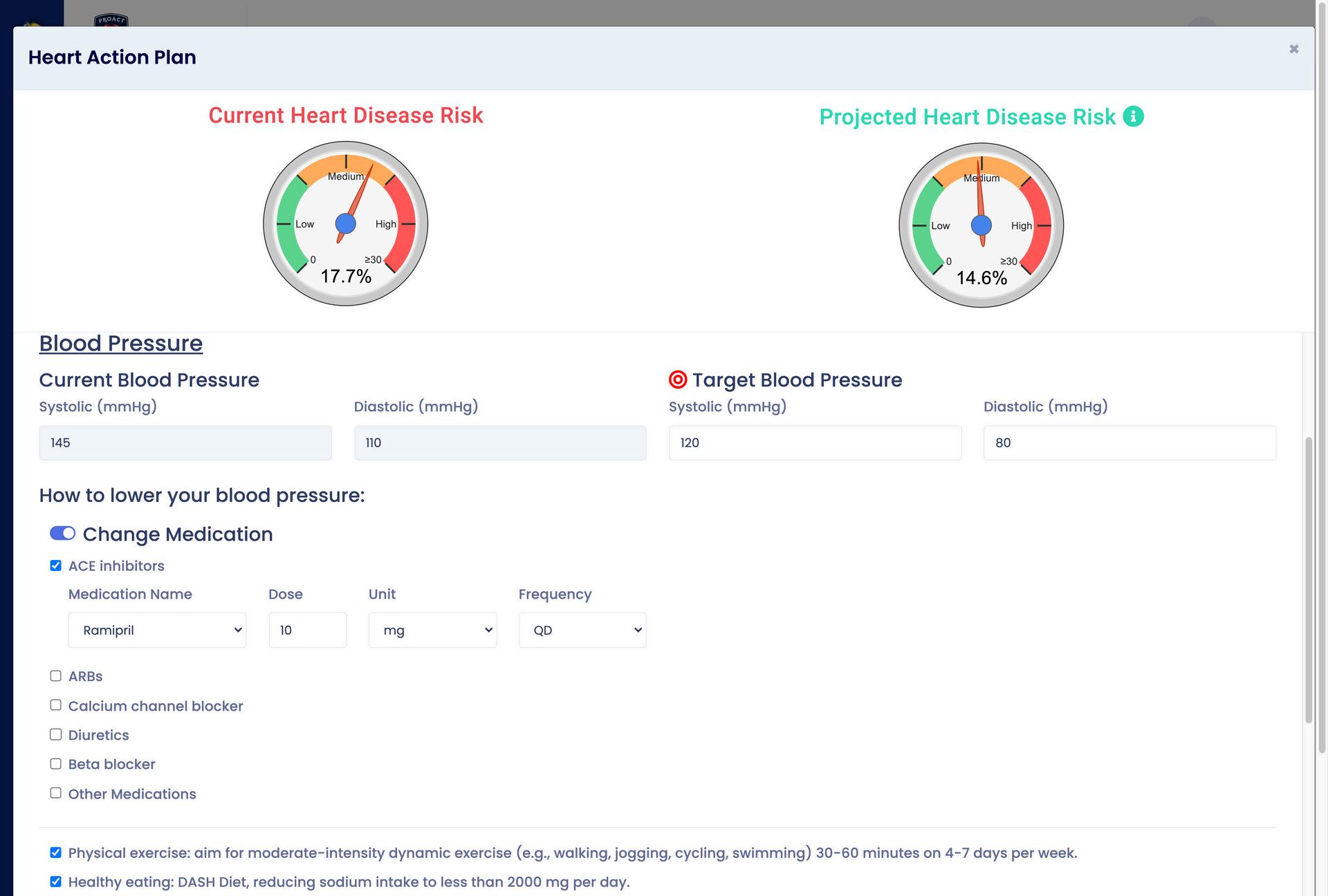
If you are interested in joining please contact: yazid.alhamarneh@ualberta.ca & shania.liu@ualberta.ca
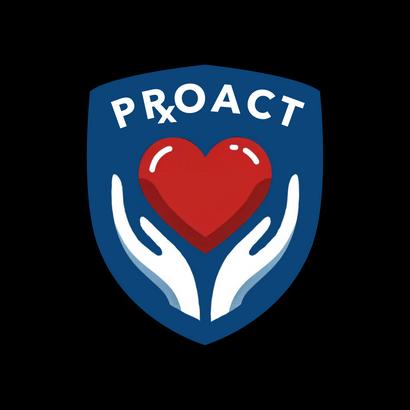

Do you find managing diabetes patients overwhelming? Is it difficult to implement the Diabetes Canada guidelines into your practice? We have the tool for you!
The D-PATH study, designed by a practising community pharmacist in Alberta, is aimed to determine if a community pharmacist-led program can help improve diabetes control and reduce the risk of diabetes-related complications in patients with type 2 diabetes who are not at their A1C target. We have developed a web-based computer algorithm that guides the pharmacist through the Diabetes Canada guidelines to provide comprehensive diabetes management and screening for diabetes-related complications To use the algorithm, you simply click through the steps and recommendations are provided to you It is very simple to use, streamlines your clinical assessment of diabetes patients, and creates all required clinical documentation
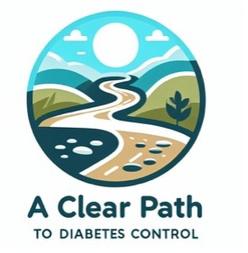
Your pharmacy will be compensated for enrolling participants in this study; this is especially helpful with the reduction in remuneration for pharmacy clinical services. In addition, the tool will automatically generate your documentation to support an initial CACP or Diabetes SMMA and follow-up visits.
How prevalent is diabetes in Alberta?
28% of Albertans live with diabetes or pre-diabetes
8% live with diagnosed diabetes
Diabetes can reduce lifespan by 5 to 15 years
What do I have to do?
Participate in a short 1-hour virtual training session. Identify patients in your pharmacy with type 2 diabetes who have not reached their A1C target: an excellent task for pharmacy students!
Obtain patient consent to participate in the study
Complete a baseline assessment and scheduled follow-ups with the patient. Follow the algorithm; patients will be randomized to the intervention or control groups
The study will last 12 months; participants are enrolled for 6 months only.
Virtual training session with pharmacist: 1 hour
Baseline participant visit: 45 minutes.
Participant follow-up visits: 10-20 minutes each (intervention group: 4 follow-ups, control group: 2 follow-ups.
Limited time needed for study documentation; algorithm produces its own documentation.
The satisfaction of helping your patients who are living with T2DM using a simple to use and comprehensive guideline-based tool
Compensation for your patient care. Pharmacies will be offered an honorarium of $150 per intervention participant and $50 per control participant when that participant completes the 6-month study.
The algorithm automatically generates your documentation for an initial CACP or Diabetes SMMA and follow-up visits.
1 Do I need to be a Certified Diabetes Educator?
a.No, you do not need to be a CDE to participate in this study. You are required to have your additional prescribing authorization and your PRAC-ID to order laboratory investigations.
2 Do all pharmacists at a participating site need to be involved?
a.No, this is not required. However, we do encourage at least 2 pharmacists to participate in the study
3.How many patients do I have to recruit?
a We are hopeful that each participating site will recruit 20 participants
4.What supports are available to me during the study?
a The study coordinator and the primary investigator are available to support pharmacy sites throughout the study via phone, text, or email.
For further information or to join the study, please contact Lorena Holtz (study coordinator) at lorena holtz@ucalgary ca or Dr Stephanie Gysel (principal investigator) at sgysel@ualberta.ca.
Thank you for your consideration to be a part of this pharmacist-led diabetes care initiative!

Have you noticed something interesting, or had a question come up in practice and thought that would make a great research question? Are you currently recruiting participants for an ongoing study?
We are always looking for ways that we can help YOU turn your questions into research studies or provide you with assistance with your ongoing endeavors. Please email us at rxexcell@ualberta.ca with any ideas or requests, and we’ll work with you to make it a reality!
